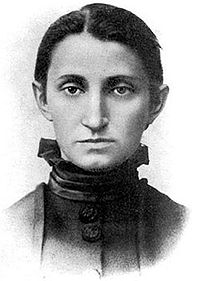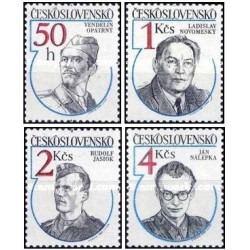- جدید
- ناموجود



توجه : درج کد پستی و شماره تلفن همراه و ثابت جهت ارسال مرسوله الزامیست .
توجه:حداقل ارزش بسته سفارش شده بدون هزینه پستی می بایست 180000 ریال باشد .
توجه : جهت برخورداری از مزایای در نظر گرفته شده برای مشتریان لطفا ثبت نام نمائید.
| Olha Kobylianska | |
|---|---|

1899 (at 36)
|
|
| Born | Ольга Кобилянська 27 November 1863 Gura Humorului, Austro-Hungary |
| Died | 21 March 1942 (aged 78) Cernăuţi, Romania |
| Nationality | Ukrainian |
| Occupation | writer, feminist |
Olha Yulianivna Kobylianska (Ukrainian: Ольга Юліанівна Кобилянська; 27 November 1863 Gura Humorului, Bukovina, Austro-Hungary - 21 March 1942 Cernăuţi, Cernăuţi County, Romania) was a Ukrainian modernist writer and feminist.
Kobylianska was born in Gura Humorului (Gura-Humora) in Bukovyna (now in Suceava County, Romania) in the family of a minor administration worker of Ukrainian noble descent from Central Ukraine. She was the fourth child of seven of Maria Werner and Yulian Yakovych Kobyliansky. One of her distant relatives was the German poet Zacharias Werner. Maria Werner was a Polonized German who was baptized a Greek Catholic and learned the local dialect of the Ukrainian language. One of Olha's brothers, Stepan Yulianovych, became a painter-portraitist, another, Yulian Yulianovych, became a philologist and was the author of several textbooks in Latin.
Kobylianska was mainly self-educated, receiving only four years of formal schooling in the German language.[1] She wrote her first works in German, beginning in 1880. Besides a proficiency in German she spoke Ukrainian as well as Polish. Sometime in 1868 she moved with her family to Suceava where her father accepted a job. There she met with Olha Ustyianovych, the daughter of Ukrainian writer Mykola Ustyianovych. In 1889 she moved to her mother's parents estate in the village of Dymka (today part of Hlyboka Raion, Chernivetska Oblast). In 1973 a museum was opened there in her memory.
In 1891 she moved to Chernivtsi. There she met Natalia Kobrynska (Ozarkevych), Doctor Sofia Okunevska, and fell in love with Kobrynska's brother, Dr. Yevhen Ozarkevych. In 1894 she became one of the initiators of the Association of Ruthenian Women in Bukovina, the program of which she included in her brochure Something about the idea of the feminist movement.[1] One of her most prominent works which captured her political and social views was the novel Tsarivna (Princess), published in the Bukovina newspaper in 1895, as well as in other publications later. She later also wrote Arystokratka (1896), Impromptu phantasie, Valse melancolique (1898), and many others. The last of these constituted a pioneering treatment of same-sex love, and was based partly on Kobylians'ka's own experiences. Simultaneously, some of her poetic and prose works in the abstract-symbolic style were published in various local magazines such as Svit and Ukrainian Hut.
In the 1890s, she enjoyed a romantic relationship with the male literary critic, Osyp Makovei, who championed Kobylians'ka's work and was comfortable with the theme of strong, independent, educated female characters who asserted their right for sexual fulfillment. The two later broke up and in 1901 Kobylians'ka met and fell in love with the female writer Lesia Ukrainka (1871-1913). They enjoyed an intense, passionate union that was conducted mainly through correspondence as illness and circumstance prevented the couple from living together.[2]
Her other well known novels were Zemlya (Land, 1902) and V nedilyu rano zillia kopala (On Sunday Morning She Gathered Herbs, 1909). Of the latter, Vitaly Chernetsky wrote:
The book's plot is based on a well-known Ukrainian folk song, "Oi ne khody, Hrytsiu..." ("O Don't Go Out, Hryts'..."). In it, a young man, Hryts', courts two young women simultaneously. One of the two women, in despair, poisons her beloved with an herb potion. Since the plot of the work is known to the reader in advance, attention is turned instead to its presentation: the narrative techniques employed, the description of nature, rural customs and rituals, and the additional subplots and details introduced by the author. The novel's plot is developed through the introduction of a new set of characters, nomadic Gypsies who move between [a rural area in the Ukrainian Carpathians] and the Hungarian plain and play a pivotal role in the text. This element of what contemporary cultural studies would term hybridity makes Kobylians'ka's novel stand out among the works of Ukrainian Modernists tackling folkloric themes.[3]
Mykhailo Starytsky later wrote a play under the same name V nedilyu rano zillia kopala. That work was also translated into several languages. Later Kobylianska met and traveled with fellow Ukrainians such as Lesia Ukrainka, Ivan Franko, Vasyl Stefanyk, and Mykhailo Kotsiubynsky, who influenced her cultural and political outlook.[4] Together with other writers such as Marko Cheremshyna, Osyp Makovey, Katria Hrynevycheva, she described World War I. Some of her stories of that period were Juda, The letter of a convicted soldier to his wife, and others.
Her writings were influenced by George Sand and Friedrich Nietzsche. Kobylianska was interested in the Ukrainian peasantry, and often wrote about the lives of these people. She depicted the struggle between good and evil and the mystical force of nature, predestination, magic, and the irrational in many of her stories of peasant life. Her works are known for their impressionistic, lyrical descriptions of nature and subtle psychological portrayals.[4]
Kobylianska's works have been published in many editions and selections. In 1944 a literary memorial museum dedicated to her was opened in Chernivtsi, in the building in which she lived from 1938-1942.
| “ | Until God gives me my powers and while I live I will work. It is our destiny to work, because the rest for us afterward will be without end. | ” |
تشکر نظر شما نمی تواند ارسال شود
گزارش کردن نظر
گزارش ارسال شد
گزارش شما نمی تواند ارسال شود
بررسی خود را بنویسید
نظر ارسال شد
نظر شما نمی تواند ارسال شود

check_circle
check_circle


















